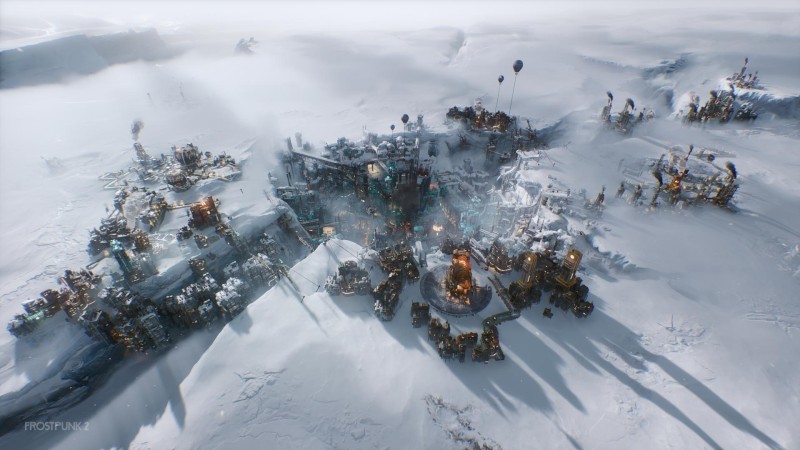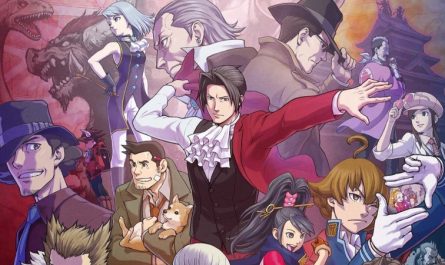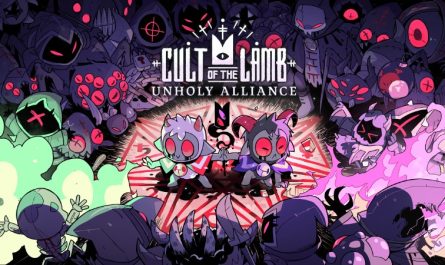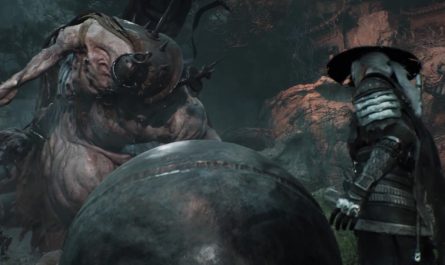Platform:
PlayStation 5, Xbox Series X/S, PC
Publisher:
11 Bit Studios
Developer:
11 Bit Studios
Release:
July 25, 2024
(PC), TBA (PlayStation 5,
Xbox Series X/S)
Rating:
Mature
The 2018 release of Frostpunk delivered a unique twist on the city-builder genre, putting you in control of a band of humans trying to survive the new ice age. Players assumed the role of The Captain as they built up their small colony of workers to a flourishing city in the post-apocalypse. Along the way, players needed to make hard decisions, like restricting food, enforcing strict authoritarian laws, putting children to work, or worse. Frostpunk 2 picks up the story 30 years later and, in the process, looks to improve nearly every aspect of the well-liked simulator.
Three decades have passed since the events of Frostpunk. The group has been roaming the frozen desert for years, but in the face of another whiteout, they return to the old machine, hoping to use its heat to survive. This is where my gameplay session begins. The old dreadnought is in pieces beneath the ice, so I have my work cut out for me in the weeks leading up to the whiteout. I must first break through the ice to reach an oil tank wagon, construct an extraction district to retrieve its oil, and then use it to ignite the furnace.
Frostpunk 2’s city operates off output – the resources you produce by districts, buildings, and workers – and demand – the food, shelter, goods, materials, and heat your people need. To satisfy the shelter and heat requirement, I build housing districts next to the furnace. Then, I frostbreak on an area with fertile soil and grow food on the patches. We’ll need a lot of food to survive the whiteout, so I build a food stockpile storehouse.
Unfortunately, 6 of my 1,350 people come down with an illness and are unable to work, hampering our ability to output food. Illnesses rise and fall based on factors like food supply, heat, and shelter availability. People can also get injured, which additionally prevents them from working. Still, at this juncture, it’s nothing to worry about, as I still have the vast majority of my population able to work. As the weeks roll on, it doesn’t look like I’ll be able to reach my goal, so Finan, a 42-year-old gardener in my group, speaks up, suggesting we work emergency shifts or tighten our belts by restricting rations to catch up to our forecast.
I don’t want to restrict rations just yet, but I do authorize emergency shifts. However, the furnace is struggling, and I’m starting to run out of oil, resulting in 30 of my people dying from the cold. Morale and trust in my leadership falls. I start to work on extracting another oil tank, but it’s becoming increasingly obvious I won’t stockpile enough food in time, so I finally restrict rations. I’m also falling behind on construction materials, so I start working to extract building materials from under the ice, but I run into a problem: I don’t have enough workers.
This constant dance of prioritization and keeping several plates spinning is when Frostpunk and, by extension, Frostpunk 2 really shine. The feeling of sand slipping through your fingers, not knowing if you should loosen or tighten your grip, but you know you need to decide quickly or face losing it all. That’s what Frostpunk and its sequel deliver in spades.
Here’s how I know things are getting dire: Another citizen approaches me – a 62-year-old seamstress – and offers the senior citizens to sacrifice themselves so that the group’s youth can continue to live. I hope it doesn’t come to that, but thankfully, I have some more tricks up my sleeve. I construct additional Food Districts and storehouses and immediately order emergency shifts. It will come down the wire, and I feel the tension in my body rising.
Then, the moment arrives: the decision point. The group is worried we won’t have enough food to survive the coming storm, so they present two options: We can let our seniors leave the group and walk out into the desert, reducing the number of mouths to feed without sacrificing our workforce or our city’s future, or we can slaughter a nearby seal colony. I don’t want to do either, so I keep going down the same path, just crossing my fingers I’m doing the right thing. That might as well be the mantra of Frostpunk 2: hope that you’re doing the right thing.
Disease is spreading, limiting the workforce, and the whiteout is approaching. With less than a week to go, we hit our food goal, but at what cost? Trust has dropped dramatically, and disease is running rampant following months of emergency shifts. That tense stretch was nothing more than the tutorial, but it appropriately captures the essence of Frostpunk 2.
I’m then taken to the primary setting of Frostpunk 2, New London. The old Captain is dead, and the city is weak. Overpopulation has run rampant, food is low, and coal is running out. You step into the role of the Steward in charge of leading New London back to prosperity. Thankfully, this first year is warmer than expected (but this is Frostpunk, so it’s still an icy mess). I need to use that to get the city back on track.
As The Captain weakened, the city became more divided, bringing maintenance to a grinding halt. I have my work cut out for me. With a city population of more than 4,200 people, I work on addressing basic needs like food, shelter, and heat. In New London, three factions have emerged, each with their own agendas, desires, and projects. Among them is The Stalwarts, a group that resulted in a binary choice I made during the tutorial. The memberships of these groups will fluctuate, and you must balance your allegiances to them, playing the game of politics as you work to improve day-to-day life.
That’s right. It’s not just about building a city and allocating workers: Frostpunk 2 requires you to secure enough votes to not only stay in power but also pass laws that you propose using the game’s intricate system. For instance, at one moment, I’m low on money, so I propose an economics law where the citizens must volunteer their free time unless they purchase an exemption, which raises funds for the city, allowing me to fund more projects. It’s not the most popular option, but I secured enough support to push it through. If your projections look less confident ahead of the vote, you can try to negotiate with the various groups in New London to try and appease them to vote for your proposal.
City-builders can be extremely hit or miss for me, but when they hit, they hit hard. With so many systems stacked on top of each other, including what appears to be an incredible laws system, Frostpunk 2 not only has me circling July 25 on my calendar, but it has me eagerly re-downloading the original Frostpunk to satisfy the small taste my hands-on session provided me. Frostpunk 2 arrives on PC on July 25, then PS5 and Xbox Series X/S at a later date.
PurchasePlatform:
PlayStation 5, Xbox Series X/S, PC
Publisher:
11 Bit Studios
Developer:
11 Bit Studios
Release:
July 25, 2024
(PC), TBA (PlayStation 5,
Xbox Series X/S)
Rating:
Mature
The 2018 release of Frostpunk delivered a unique twist on the city-builder genre, putting you in control of a band of humans trying to survive the new ice age. Players assumed the role of The Captain as they built up their small colony of workers to a flourishing city in the post-apocalypse. Along the way, players needed to make hard decisions, like restricting food, enforcing strict authoritarian laws, putting children to work, or worse. Frostpunk 2 picks up the story 30 years later and, in the process, looks to improve nearly every aspect of the well-liked simulator.
Three decades have passed since the events of Frostpunk. The group has been roaming the frozen desert for years, but in the face of another whiteout, they return to the old machine, hoping to use its heat to survive. This is where my gameplay session begins. The old dreadnought is in pieces beneath the ice, so I have my work cut out for me in the weeks leading up to the whiteout. I must first break through the ice to reach an oil tank wagon, construct an extraction district to retrieve its oil, and then use it to ignite the furnace.
Frostpunk 2’s city operates off output – the resources you produce by districts, buildings, and workers – and demand – the food, shelter, goods, materials, and heat your people need. To satisfy the shelter and heat requirement, I build housing districts next to the furnace. Then, I frostbreak on an area with fertile soil and grow food on the patches. We’ll need a lot of food to survive the whiteout, so I build a food stockpile storehouse.
Unfortunately, 6 of my 1,350 people come down with an illness and are unable to work, hampering our ability to output food. Illnesses rise and fall based on factors like food supply, heat, and shelter availability. People can also get injured, which additionally prevents them from working. Still, at this juncture, it’s nothing to worry about, as I still have the vast majority of my population able to work. As the weeks roll on, it doesn’t look like I’ll be able to reach my goal, so Finan, a 42-year-old gardener in my group, speaks up, suggesting we work emergency shifts or tighten our belts by restricting rations to catch up to our forecast.
I don’t want to restrict rations just yet, but I do authorize emergency shifts. However, the furnace is struggling, and I’m starting to run out of oil, resulting in 30 of my people dying from the cold. Morale and trust in my leadership falls. I start to work on extracting another oil tank, but it’s becoming increasingly obvious I won’t stockpile enough food in time, so I finally restrict rations. I’m also falling behind on construction materials, so I start working to extract building materials from under the ice, but I run into a problem: I don’t have enough workers.
This constant dance of prioritization and keeping several plates spinning is when Frostpunk and, by extension, Frostpunk 2 really shine. The feeling of sand slipping through your fingers, not knowing if you should loosen or tighten your grip, but you know you need to decide quickly or face losing it all. That’s what Frostpunk and its sequel deliver in spades.
Here’s how I know things are getting dire: Another citizen approaches me – a 62-year-old seamstress – and offers the senior citizens to sacrifice themselves so that the group’s youth can continue to live. I hope it doesn’t come to that, but thankfully, I have some more tricks up my sleeve. I construct additional Food Districts and storehouses and immediately order emergency shifts. It will come down the wire, and I feel the tension in my body rising.
Then, the moment arrives: the decision point. The group is worried we won’t have enough food to survive the coming storm, so they present two options: We can let our seniors leave the group and walk out into the desert, reducing the number of mouths to feed without sacrificing our workforce or our city’s future, or we can slaughter a nearby seal colony. I don’t want to do either, so I keep going down the same path, just crossing my fingers I’m doing the right thing. That might as well be the mantra of Frostpunk 2: hope that you’re doing the right thing.
Disease is spreading, limiting the workforce, and the whiteout is approaching. With less than a week to go, we hit our food goal, but at what cost? Trust has dropped dramatically, and disease is running rampant following months of emergency shifts. That tense stretch was nothing more than the tutorial, but it appropriately captures the essence of Frostpunk 2.
I’m then taken to the primary setting of Frostpunk 2, New London. The old Captain is dead, and the city is weak. Overpopulation has run rampant, food is low, and coal is running out. You step into the role of the Steward in charge of leading New London back to prosperity. Thankfully, this first year is warmer than expected (but this is Frostpunk, so it’s still an icy mess). I need to use that to get the city back on track.
As The Captain weakened, the city became more divided, bringing maintenance to a grinding halt. I have my work cut out for me. With a city population of more than 4,200 people, I work on addressing basic needs like food, shelter, and heat. In New London, three factions have emerged, each with their own agendas, desires, and projects. Among them is The Stalwarts, a group that resulted in a binary choice I made during the tutorial. The memberships of these groups will fluctuate, and you must balance your allegiances to them, playing the game of politics as you work to improve day-to-day life.
That’s right. It’s not just about building a city and allocating workers: Frostpunk 2 requires you to secure enough votes to not only stay in power but also pass laws that you propose using the game’s intricate system. For instance, at one moment, I’m low on money, so I propose an economics law where the citizens must volunteer their free time unless they purchase an exemption, which raises funds for the city, allowing me to fund more projects. It’s not the most popular option, but I secured enough support to push it through. If your projections look less confident ahead of the vote, you can try to negotiate with the various groups in New London to try and appease them to vote for your proposal.
City-builders can be extremely hit or miss for me, but when they hit, they hit hard. With so many systems stacked on top of each other, including what appears to be an incredible laws system, Frostpunk 2 not only has me circling July 25 on my calendar, but it has me eagerly re-downloading the original Frostpunk to satisfy the small taste my hands-on session provided me. Frostpunk 2 arrives on PC on July 25, then PS5 and Xbox Series X/S at a later date.
PurchaseRead MoreGame Informer



